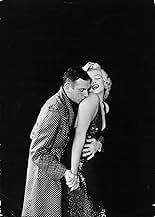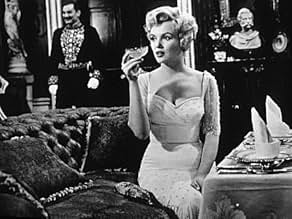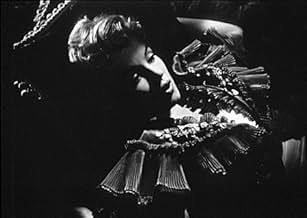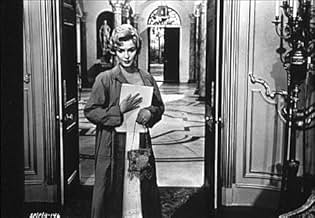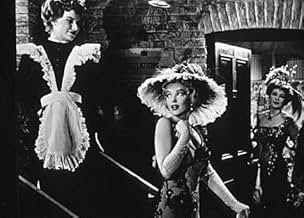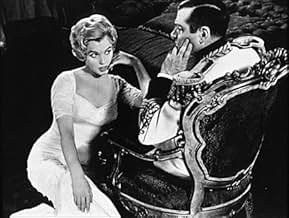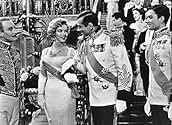NOTE IMDb
6,4/10
9,6 k
MA NOTE
Ajouter une intrigue dans votre langueAn American showgirl becomes entangled in political intrigue when the Prince Regent of a foreign country attempts to seduce her.An American showgirl becomes entangled in political intrigue when the Prince Regent of a foreign country attempts to seduce her.An American showgirl becomes entangled in political intrigue when the Prince Regent of a foreign country attempts to seduce her.
- Réalisation
- Scénario
- Casting principal
- Nomination aux 5 BAFTA Awards
- 2 victoires et 6 nominations au total
Andreas Malandrinos
- Valet with Violin
- (as Andrea Melandrinos)
Avis à la une
Considering that all of the backstage talk on the making of 'The Prince and the Showgirl' tells us that a huge rift developed between Oliver and Monroe, their chemistry in this charming comedy is incredible and very apparent. Oliver has his stuffiest role since 'Pride and Prejudice' and does a standout job. Their would-be seduction scene early on, where a tipsy Monroe confronts him with a show of confidence amidst her giggles, is a highlight of the film and sets the tone for the kind of banter between them.
Marilyn never looked more elegant than she does here, costumed and coiffed to look incredibly beautiful. The others in the cast are all impressive in their supporting roles but the main drawback is a script that lumbers along, poorly paced and finally going nowhere. At least twenty minutes of footage could have been clipped to make the whole thing more watchable.
But if you enjoy seeing Marilyn play comedy, this is the one for you. Never has she shown such a flair for enjoying herself in a role. One would never suspect that rumors of unprofessional behavior and disputes with Oliver were even remotely true. The finished product has a glossy, elegant and thoroughly professional look--and as I said before, the only drawback is the script itself and a story too slight to make it totally absorbing. But Laurence Olivier and Marilyn Monroe are both excellent--and, surprisingly, Monroe even upstages him more than once.
Marilyn never looked more elegant than she does here, costumed and coiffed to look incredibly beautiful. The others in the cast are all impressive in their supporting roles but the main drawback is a script that lumbers along, poorly paced and finally going nowhere. At least twenty minutes of footage could have been clipped to make the whole thing more watchable.
But if you enjoy seeing Marilyn play comedy, this is the one for you. Never has she shown such a flair for enjoying herself in a role. One would never suspect that rumors of unprofessional behavior and disputes with Oliver were even remotely true. The finished product has a glossy, elegant and thoroughly professional look--and as I said before, the only drawback is the script itself and a story too slight to make it totally absorbing. But Laurence Olivier and Marilyn Monroe are both excellent--and, surprisingly, Monroe even upstages him more than once.
Just saw this again the other day after many years, and was impressed by Monroe's effortless upstaging of Olivier, who gives the most hammy, artificial performance of his career, unsurprising as he is directing himself.
If you want to see what star quality means, just watch their scenes together. He is desperately trying to ACT and eclipse her. All she has to do is just BE there in shot.
Whenever they are on screen, it is always her that one's eyes are drawn to and she gives such a natural performance throughout it almost seems as if she isn't acting at all. She also copes with some extremely tricky dialogue, giving the lie to her inability to remember lines. These are often done in a single take - one scene in particular, early in the film as she is leaving the house before Olivier arrives home, talking rapidly to Richard Wattis as they walk down the long staircase, is outstanding.
So, the film is worthwhile in showing Monroe as the great star she was - and revealing Olivier to only be capable of mere caricature (that fake German accent is so awful) without a strong director to rein him in.
If you want to see what star quality means, just watch their scenes together. He is desperately trying to ACT and eclipse her. All she has to do is just BE there in shot.
Whenever they are on screen, it is always her that one's eyes are drawn to and she gives such a natural performance throughout it almost seems as if she isn't acting at all. She also copes with some extremely tricky dialogue, giving the lie to her inability to remember lines. These are often done in a single take - one scene in particular, early in the film as she is leaving the house before Olivier arrives home, talking rapidly to Richard Wattis as they walk down the long staircase, is outstanding.
So, the film is worthwhile in showing Monroe as the great star she was - and revealing Olivier to only be capable of mere caricature (that fake German accent is so awful) without a strong director to rein him in.
This is one of those movies where the set pace of events are known to the audience, so that when it reaches it's conclusion we are aware that what we (the audience) might wish can happen for the two leads is not going to be possible.
It is 1911, and we are in London for the coronation week of King George V and his wife Queen Mary. If you have read THE GUNS OF AUGUST by Barbara Tuchman, this event was the last great occasion for the appearance of all the crowned heads of Europe prior to the destruction (in seven years) of three leading houses (Hohenzollern, Romanov, and Hapsburg) due to World War II. Despite the survival of several other monarchies in Scandanavia, the Benelux countries, and (in revival) in Spain, the three lost ones of 1918 are now joined by the lost ones of the Balkans. And it is the Balkans that is the spot that Laurence Olivier's Carpathia is located in.
In reality Carpathia is part of Hungary and Roumania. Part of it (Transylvania) is well known through the story of Dracula. But for the sake of this story, it is an independent kingdom like Roumania, Bulgaria, and Serbia at that time. Prince Charles, the Regent of Carpathia, is running the country until his son King Nicholas comes of age in 18 months. So sometime in 1913 Nicholas will start ruling in his own name, and he is pro-German. Charles is pro-English. This would be unimportant but Carpathia has the fourth best army in Europe, so if it shifts it's position it may cause an unbalanced international situation that may lead to a general war.
Charles (Laurence Olivier) and Nicholas (Jeremy Spenser) and Nicholas' grandmother the Queen Dowager (Sybil Thorndike) are attending it. Charles is being monitored by Foreign Office official Northbrook (Richard Wattis), who wants to make sure the Regent is happy on his visit. Charles attends a show, and decides that one of the minor actresses, Elsie Mariner (Marilyn Monroe) should be invited to the Carpathian Embassy for a late supper. Despite misgivings Northbrook arranges for Elsie to show up.
But Elsie (although welcomed by the amorous Charles) finds she has to watch as he spends time talking about a political problem at home - the capture of one of Nicholas' clique of pro-German friends who has been caught with some compromising documents that would hurt the King. Charles plans to squeeze the arrested man for all the information he can get about Nicholas' schemes, but admits to his telephone informant that he is more likely to have problems about the situation from President Taft and his meddlesome Americans than from anyone else. Elsie, who overhears this, is angered (she is an American). The result is a moment that most fans of Monroe don't recall. They remember that she sang Happy Birthday to President Kennedy once, but here she toasted President William Howard Taft with champagne.
Charles finds Elsie not like other women he has had one night stands with. First, he never gets to first base with her (she gets drunk and falls asleep, despite his varied attempts to get her into the right mood and position). Second, she does not leave as he hopes, but keeps getting stuck deeper and deeper into the embassy and the Royal Family's world (even attending the coronation at Westminster Abbey). She is there for the embassy ball, and she even has a second night where she is in control of the trysting. Charles married his late wife and did his duty for her and her country, but he finds he loves Elsie. But he is leaving at the start of the third day for Carpathia with his mother and son, and has another 18 months of duty before he is free. And Elsie has 18 months left to her play contract. They do say "au revoir" at the end, but will they get back together. For they can't until 1913, the start of the Second Balkan War, and one of the steps that brought World War I to fruition.
The film was based on a play, THE SLEEPING PRINCE by Terence Rattigan, one of the best dramatists of England in the 20th Century (THE WINSLOW BOY, THE BROWNING VERSION). A practitioner of what Shaw called "the well-made play", Rattigan made sure his plays were entertaining and intelligent, and his characters were realistic. But in the original play Elsie was not American, but English, and was played by Vivien Leigh. Olivier had thought of filming the play with Leigh, but her illness interfered. Monroe was available, and was big box-office. Olivier was to direct her, his first film direction assignment since RICHARD III. She gave so much difficulty to him, he did not direct another film until 1970 when he did Checkov's THE THREE SISTERS.
But the film has it's period charms and a literate script. It does capture the brittle social and diplomatic world of 1911 quite well. Olivier's Regent is not as great a part as Richard III or Hamlet or Othello, but he does have a grasp on the man's pride and sense of self-importance. Monroe does come across as intelligent regarding family matters (i.e. the Regent and his son, the King), as well as an understanding woman. Wattis shoulders the dignity of the foreign office ruffled by the crazy duties he has to shoulder that week. Sybil Thorndike, with her fears of anarchists, and belief that Elsie is a close friend of Sarah Bernhart, is in a peculiar portion of the universe. She carries off an eccentric royal type that is light years away from her aged, vicious crone in BRITTANIA MEWS. It was not a major film - certainly not in the same category as the three Olivier Shakespeare films, but it is a good minor one.
It is 1911, and we are in London for the coronation week of King George V and his wife Queen Mary. If you have read THE GUNS OF AUGUST by Barbara Tuchman, this event was the last great occasion for the appearance of all the crowned heads of Europe prior to the destruction (in seven years) of three leading houses (Hohenzollern, Romanov, and Hapsburg) due to World War II. Despite the survival of several other monarchies in Scandanavia, the Benelux countries, and (in revival) in Spain, the three lost ones of 1918 are now joined by the lost ones of the Balkans. And it is the Balkans that is the spot that Laurence Olivier's Carpathia is located in.
In reality Carpathia is part of Hungary and Roumania. Part of it (Transylvania) is well known through the story of Dracula. But for the sake of this story, it is an independent kingdom like Roumania, Bulgaria, and Serbia at that time. Prince Charles, the Regent of Carpathia, is running the country until his son King Nicholas comes of age in 18 months. So sometime in 1913 Nicholas will start ruling in his own name, and he is pro-German. Charles is pro-English. This would be unimportant but Carpathia has the fourth best army in Europe, so if it shifts it's position it may cause an unbalanced international situation that may lead to a general war.
Charles (Laurence Olivier) and Nicholas (Jeremy Spenser) and Nicholas' grandmother the Queen Dowager (Sybil Thorndike) are attending it. Charles is being monitored by Foreign Office official Northbrook (Richard Wattis), who wants to make sure the Regent is happy on his visit. Charles attends a show, and decides that one of the minor actresses, Elsie Mariner (Marilyn Monroe) should be invited to the Carpathian Embassy for a late supper. Despite misgivings Northbrook arranges for Elsie to show up.
But Elsie (although welcomed by the amorous Charles) finds she has to watch as he spends time talking about a political problem at home - the capture of one of Nicholas' clique of pro-German friends who has been caught with some compromising documents that would hurt the King. Charles plans to squeeze the arrested man for all the information he can get about Nicholas' schemes, but admits to his telephone informant that he is more likely to have problems about the situation from President Taft and his meddlesome Americans than from anyone else. Elsie, who overhears this, is angered (she is an American). The result is a moment that most fans of Monroe don't recall. They remember that she sang Happy Birthday to President Kennedy once, but here she toasted President William Howard Taft with champagne.
Charles finds Elsie not like other women he has had one night stands with. First, he never gets to first base with her (she gets drunk and falls asleep, despite his varied attempts to get her into the right mood and position). Second, she does not leave as he hopes, but keeps getting stuck deeper and deeper into the embassy and the Royal Family's world (even attending the coronation at Westminster Abbey). She is there for the embassy ball, and she even has a second night where she is in control of the trysting. Charles married his late wife and did his duty for her and her country, but he finds he loves Elsie. But he is leaving at the start of the third day for Carpathia with his mother and son, and has another 18 months of duty before he is free. And Elsie has 18 months left to her play contract. They do say "au revoir" at the end, but will they get back together. For they can't until 1913, the start of the Second Balkan War, and one of the steps that brought World War I to fruition.
The film was based on a play, THE SLEEPING PRINCE by Terence Rattigan, one of the best dramatists of England in the 20th Century (THE WINSLOW BOY, THE BROWNING VERSION). A practitioner of what Shaw called "the well-made play", Rattigan made sure his plays were entertaining and intelligent, and his characters were realistic. But in the original play Elsie was not American, but English, and was played by Vivien Leigh. Olivier had thought of filming the play with Leigh, but her illness interfered. Monroe was available, and was big box-office. Olivier was to direct her, his first film direction assignment since RICHARD III. She gave so much difficulty to him, he did not direct another film until 1970 when he did Checkov's THE THREE SISTERS.
But the film has it's period charms and a literate script. It does capture the brittle social and diplomatic world of 1911 quite well. Olivier's Regent is not as great a part as Richard III or Hamlet or Othello, but he does have a grasp on the man's pride and sense of self-importance. Monroe does come across as intelligent regarding family matters (i.e. the Regent and his son, the King), as well as an understanding woman. Wattis shoulders the dignity of the foreign office ruffled by the crazy duties he has to shoulder that week. Sybil Thorndike, with her fears of anarchists, and belief that Elsie is a close friend of Sarah Bernhart, is in a peculiar portion of the universe. She carries off an eccentric royal type that is light years away from her aged, vicious crone in BRITTANIA MEWS. It was not a major film - certainly not in the same category as the three Olivier Shakespeare films, but it is a good minor one.
The title of this film might well be "Watch Marilyn seduce Laurence Olivier". Marilyn had an amazing, nearly unique, quality of "sex appeal". Not that other actresses aren't beautiful or sexy, but Marilyn stands alone, as the greatest screen goddess. The way she moved, the way she talked, it's almost unbelievable how appealing she was. This movie seems designed to show off her abilities in this regard. As such, it is a movie that is worth watching, assuming that you are interested in watching a woman seducing a man.
In other respects, the movie is not a great film. The plot has almost no drama to it. The comedy is so "genteel" as to hardly merit a polite chuckle. Sir Laurence is fine as the stiff, un-romantic prince who tries to avoid falling for Marilyn's charms but there is little "fire" to his performance.
Ultimately the movie rests on Marilyn's remarkable talent for being "desirable". I rate this film just behind "The Seven Year Itch" but it does feature more screen time for Marilyn.
BTW: I see some real resemblance between MM in this film and Jessica Lange (circa "Tootsie").
In other respects, the movie is not a great film. The plot has almost no drama to it. The comedy is so "genteel" as to hardly merit a polite chuckle. Sir Laurence is fine as the stiff, un-romantic prince who tries to avoid falling for Marilyn's charms but there is little "fire" to his performance.
Ultimately the movie rests on Marilyn's remarkable talent for being "desirable". I rate this film just behind "The Seven Year Itch" but it does feature more screen time for Marilyn.
BTW: I see some real resemblance between MM in this film and Jessica Lange (circa "Tootsie").
Grand Duke Charles (Laurence Olivier) is the prince-regent of Carpathia, a fictional Balkan country which could be the cause of a worldwide war. He's in London with his pro-German minor son and the Dowager Queen to attend the coronation of King George V in 1911. British foreign officer Northbrook (Richard Wattis) is tasked with getting him whatever he wants. The Prince is completely taken by the actress Elsie Marina (Marilyn Monroe) at the Coconut Girl Club. Northbrook brings her to a supper for two.
Laurence Olivier is very stiff which is his character. He's a tiresome old geezer. He is utterly overshadowed by Marilyn Monroe in every scene. This is a very unlikeable romance. The two characters and actors have no chemistry whatsoever. When it comes, the romance feels forced and uncomfortable. Monroe is great when she's drunk acting. She's magical and the screen loves her. The difference between the two can't be any greater. She is fun and hilarious. The movie grinds down whenever she's not on the screen.
Laurence Olivier is very stiff which is his character. He's a tiresome old geezer. He is utterly overshadowed by Marilyn Monroe in every scene. This is a very unlikeable romance. The two characters and actors have no chemistry whatsoever. When it comes, the romance feels forced and uncomfortable. Monroe is great when she's drunk acting. She's magical and the screen loves her. The difference between the two can't be any greater. She is fun and hilarious. The movie grinds down whenever she's not on the screen.
Le saviez-vous
- AnecdotesMarilyn Monroe and Sir Laurence Olivier had trouble filming together. He would often get angry at her forgetting lines or being late to the set. Monroe was furious one day while filming, when Laurence told her to "just be sexy".
- GaffesNorthbrook refers to the foxtrot, a dance that didn't premiere until 1914, three years later.
- Citations
Elsie Marina: Yes, I speak German. I was born in Milwaukee.
- ConnexionsFeatured in ABC Stage 67: The Legend of Marilyn Monroe (1966)
- Bandes originalesThe Duke of York
(uncredited)
Traditional
Arranged by Cecil H. Jaeger
Meilleurs choix
Connectez-vous pour évaluer et suivre la liste de favoris afin de recevoir des recommandations personnalisées
Détails
- Date de sortie
- Pays d’origine
- Langues
- Aussi connu sous le nom de
- The Prince and the Showgirl
- Lieux de tournage
- Sociétés de production
- Voir plus de crédits d'entreprise sur IMDbPro
Box-office
- Montant brut mondial
- 8 437 $US
- Durée1 heure 55 minutes
Contribuer à cette page
Suggérer une modification ou ajouter du contenu manquant


